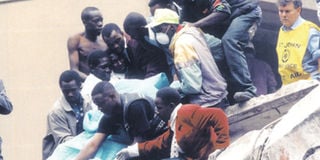Terror resilience since ’98 bombing a success story

A survivor of the 1998 terror attack in Nairobi is removed from ground zero. Photo/FILE
What you need to know:
- Kenya’s resilience to terrorism is a global success story.
The ideological and ‘class’ disputes between the foreign and homegrown fighters have been on the rise.
The Kenyans in Al-Shabaab have suffered the most from these wrangles and many have defected.
August is, arguably, a jinxed month for Kenya. This notion is hitched on the calamities that have befallen the country during the month over the years.
Hence, the terror attack on the US embassy in Nairobi on August 7, 1998 is etched in the minds of Kenyans. A bomb blast masterminded by Osama bin Laden, the then-Al-Qaeda terror group leader, and its African offshoot, Egypt-based Islamic Jihad, killed and injured Kenyans and Americans and destroyed property.
Despite this being Kenya’s first major terrorist attack, its handling of the incident and the resultant investigations in collaboration with international partners was impressive.
Global success story
Notably, the government’s coordinated and timely response averted possible mass casualties. It was also an eye opener: It compelled the government to reconfigure its counter-terrorism mechanisms, including a robust strategy.
Kenya’s resilience to terrorism is a global success story. The bomb blast inadvertently brought out a rare sense of oneness that culminated in a national psyche, ‘Kenyans United against Terrorism’, increasing citizen participation through the sharing of information with security agencies and bringing into operation initiatives like Nyumba Kumi community policing and other neighbourhood watch forums.
Forging a united front
Security agencies engaged their partners, including mwananchi, forging a united front against terrorism, while citizen-centred support systems to terror survivors have helped them to overcome grief.
Today, as Kenya commemorates 22 years since the bomb blast, locals and foreigners will flock the August 7th Memorial Park, the scene of the attack, to pay homage to victims and survivors of the heinous act.
They will paint the park in colours of hope, peace, resilience, resolve and determination to signify victory against terrorism to shame the terrorists and spell out our enduring resolve to defeat them.
Attempts by Somalia-based Al-Shabaab terror group to associate with Al Qaeda has not yielded much. Instead, Al-Shabaab’s affiliation to Al Qaeda has caused internal wrangles occasioned by fighting for leadership positions and blood money.
The ideological and ‘class’ disputes between the foreign and homegrown fighters have been on the rise.
The Kenyans in Al-Shabaab have suffered the most from these wrangles and many have defected. Since the 1998 attack, security agencies have neutralised terrorists and terror cells as progressive legislation and proactive judicial systems sent many terrorists to jail. Defectors and radicalised youth are undergoing deradicalisation and reintegration through the terrorism amnesty and reintegration programme.
Just as Kenya defeated Al Qaeda, it has degraded Al-Shabaab. The next generation of heroes and heroines will be those who fight terrorism.
Mr Mugwang’a, communications consultant, is a former crime and security reporter. [email protected].




